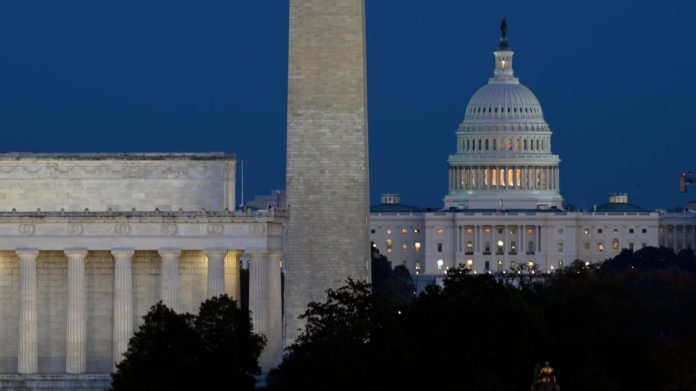WASHINGTON — The Senate on Monday night passed its plan to end the longest-ever U.S. government shutdown, and House members were already traveling from home districts to finalize congressional action by Wednesday.
The vote was 60 to 40.
President Donald Trump said he supports the product of the Senate compromise between Republican leaders and eight Democrats and will swiftly sign the deal into law once the House approves it and sends it to him.
“It’s too bad it was closed, but we’ll be opening up our country very quickly,” Trump said in the Oval Office on Monday, which was the 41st day of the federal closure.
WHAT NEWSDAY FOUND
- The Senate on Monday night approved a deal to end the longest-ever U.S. government shutdown, and House members were already traveling from home districts to finalize congressional action by Wednesday.
- President Donald Trump said he supports the Senate compromise reached between Republican leaders and eight Democrats, and will swiftly sign the deal into law once Congress passes it and sends it to him.
- House Republican leaders were expecting the take up the measure in that chamber by the middle of the week, and House Democratic leaders were already encouraging their members to oppose it.
House Republican leaders were expecting to take up the now Senate-passed measure in their chamber on Wednesday.
Leaders of the House Democratic minority were already encouraging their members to oppose the bill because it does not include language to renew Affordable Care Act premium subsidies that are set to expire for 24 million Americans at the end of the year.
The multipart legislative package passed by the Senate would restart and extend government funding to most agencies through the end of January. Attached to that resolution are three full-year spending bills to fund military construction and veterans affairs, the legislative branch and the Department of Agriculture through next September.
The deal also would restore relief to low-income individuals and families that have seen lapses in food subsidies and some health programs, and help end chaos for travelers caused by canceled flights and other disruptions.
Language in the package also calls for rehiring federal employees who were terminated during the shutdown, providing back pay for all federal employees regardless of status, and wording to prevent future reductions in the federal workforce.
Procedural votes
Before passage Monday night, the Senate waded through a series of debates and procedural votes on amendments and other items. Some members remained confident they would complete passage in time to attend Veterans Day events in their states.
One vote was on an amendment from Sen. Rand Paul (R-Ky.) to remove language from the agriculture funding bill he said would shut down the hemp industry across the country, including in his home state. His amendment was defeated.
Democrats in both chambers and across the country remained furious that eight Senate members crossed the political aisle to provide crucial votes Sunday that allowed the Republican plan to advance.
As a result of those defections, Democrats lost their leverage to force inclusion in the measure of language they wanted to renew expiring ACA tax credits, subsidies they say have kept health insurance affordable for millions of Americans.
What Democrats received, instead, was a promise from Majority Leader John Thune (R-S.D.) of a vote on a Senate standalone bill to renew those subsidies in December. That promise was described as “meaningless” by Sen. Bernie Sanders (I-Vt.) and others, because, Sanders said, Trump would not sign it into law, anyhow.
Speaker Mike Johnson (R-La.) earlier on Monday declined to give any assurances when pressed by reporters whether he would hold such a vote in the House — even if the Senate did pass a version.
“Ending the shutdown shouldn’t come at the expense of health care for tens of millions of Americans,” offered New York Gov. Kathy Hochul, in a post on X. “This deal paves the way for devastating premium hikes that will drive up costs for New Yorkers. Count me out.”
Sen. Chris Murphy (D-Conn.) bemoaned in a post on X that “we could have won” on the Affordable Care Act premium fight. “The people were on our side. We were building momentum to help save our democracy.”
And while Senate Minority Leader Chuck Schumer (D-N.Y.), like New York’s junior Sen. Kirsten Gillibrand, voted against the measure, that didn’t mute ongoing criticism of Schumer as a party leader. Some say he bore responsibility to keep Democrats more in line.
“Sen. Schumer is no longer effective and should be replaced,” Rep. Ro Khanna (D-Calif.) wrote on X. “If you can’t lead the fight to stop health care premiums from skyrocketing for Americans, what will you fight for?”
House Minority Leader Hakeem Jeffries, who like Schumer is from Brooklyn, would have no part in that sort of criticism.
“I certainly believe that Senate Democrats, the overwhelming majority of Senate Democrats, led by Chuck Schumer, have waged a valiant fight over the last seven weeks, defeating the partisan Republican spending bill 14 of 15 different times, week after week, and continue to oppose this effort of passing legislation that does not address the Republican health care crisis,” Jeffries said.
Do you view him as effective, and should he keep the job?” Jeffries was asked during a news conference.
He replied, “Yes and yes.”
Outlook in House
Jeffries said he and Democrats in the House will keep fighting for the health care concerns as the bill makes it way to that chamber, which has not voted since Sept. 19. But there are limited avenues by which they can actually stop the bill — as there were when the House initially passed its bill in September to temporarily fund government.
Speaker Johnson has a narrow GOP majority — at 219 seats to 214 seats after the House finally reconvenes Wednesday and a newly elected Democratic member is sworn-in.
But Johnson seemed confident after a conference call Monday with his GOP conference that House Republicans are unified behind the bill. He was calling members to come to Washington “right away” for a vote by Wednesday afternoon.
“It appears to us this morning that our long national nightmare is finally coming to an end,” Johnson said. “And we’re grateful for that.”







